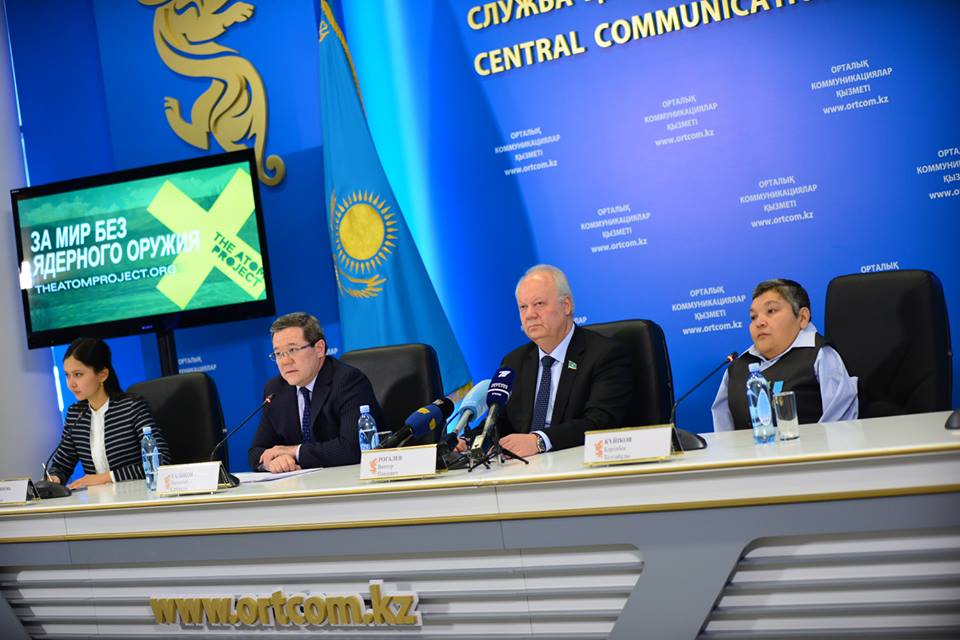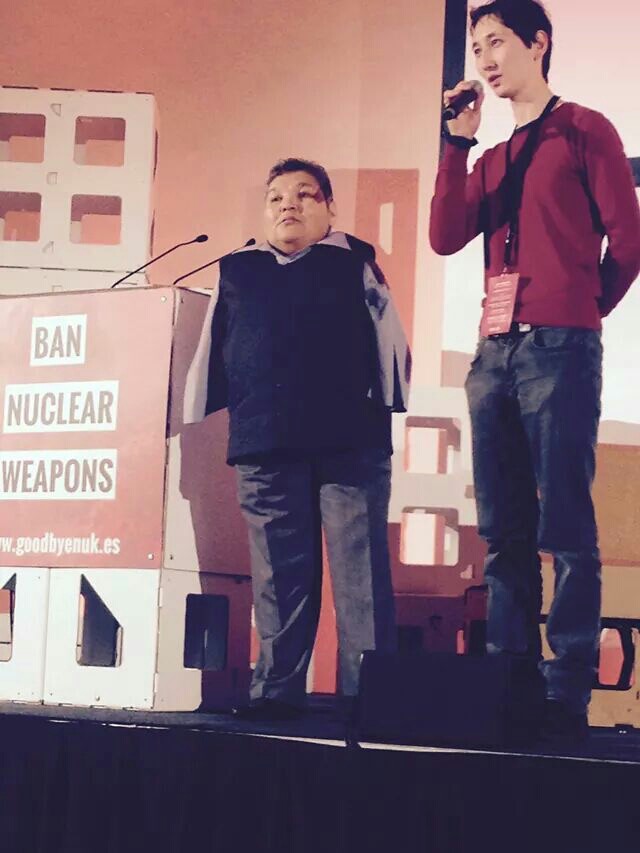VIENNA – While attending the third International Conference on the Humanitarian Impact of Nuclear Weapons in Vienna from Dec. 8-9, artist Karipbek Kuyukov made a lasting impression on delegates from all over the world.
More than 700 officials from 158 countries, as well as activists from nongovernmental organisations and the mass media attended the two-day. The difference between this conference and the earlier ones in Oslo in March 2013 and Nayarit, Mexico, in February 2014, was that three out of five recognised nuclear weapon states were represented in the Austrian capital, including China, the United Kingdom and the United States.
Participants were treated to a special showing of Kuyukov’s mobile exhibition and a timeline presentation of Kazakhstan’s nuclear non-proliferation efforts.
“My parents were live witnesses to the nuclear testing that had been conducted at the Soviet Union’s Semipalatinsk nuclear test site for over 40 years. They watched as the mushroom clouds formed in the air and the soil flew up into the stratosphere,” Kuyukov, who serves as the Honorary Ambassador of The ATOM Project, said in sharing his tragic past. “I have seen many children born with deformations. My own parents had two children who didn’t live to be one year old. I want to ask you, dear delegates, how can you allow for these weapons to exist?”
Kuyukov, a victim of the nuclear testing at Semipalatinsk, was born without arms, but manages to express his creativity through painting with his mouth and feet. He travels throughout the world on behalf of The ATOM Project and speaks out against nuclear weapons, calling on everyone to sign a petition to world leaders to ban them for good.
Kazakhstan’s official delegation, headed by the country’s Ambassador to Austria and Permanent Representative to International Organisations in Vienna, Kairat Sarybay, included Senator Baktybai Chelpekov, member of the Mazhilis (lower house of Parliament) Viktor Rogalev and Ambassador-at-Large Barlybai Sadykov. The delegation invited Kuyukov to speak at the conference to the astonishment of many. His address and artworks once again reminded the world of the tragic consequences of nuclear testing.

Karipbek Kuyukov (r) meets a Hibakusha (l) (Japanese atomic bombing survivors) in Vienna during the civil forum Dec. 6-7.
“Speaking on behalf of all victims of nuclear testing, I want my generation to be the last generation to bear the effects of this monstrous evil,” Kuyukov said to the attendees of the conference, drawing enthusiastic applause.
Kuyukov also generated a great deal of interest at the ICAN civil society forum that was held on the eve of the Vienna conference. Kuyukov’s personal story and on-going battle against nuclear weapons was enriched at the event by attending Hibakusha (Japanese atomic bombing survivors) and victims of nuclear testing from Utah (affected by nuclear weapons testing in neighbouring state of Nevada) and the Marshall Islands who shared their experiences.
The historic decision to close the nuclear testing site near Semipalatinsk for the sake of the people of independent Kazakhstan as well as global security was underscored at the conference. Around 500 atmospheric, surface and underground nuclear tests were conducted during the site’s 40 years of operations that devastated the local population and countryside. The closing of the Semipalatinsk nuclear test site by a historic decree from President Nazarbayev was a substantial contribution to global nuclear disarmament and non-proliferation, several delegations noted during the conference. They noted that the rejection of nuclear weapons and their subsequent elimination in Kazakhstan serves as a precedent for other countries to follow.
The conference ended with the chairman’s summary from Austria which highlighted the urgent need for more robust global efforts to move forward the nuclear disarmament efforts.
“States, international organisations, UN entities, the Red Cross and Red Crescent movement and civil society representatives recalled their deep concern at the catastrophic humanitarian consequences of any use of nuclear weapons,” the summary noted. “They welcomed the convening of the Vienna 3 Conference on the Humanitarian Impact of Nuclear Weapons. Participants appreciated the testimonials of survivors of nuclear weapons use and testing, including for educating and raising awareness among youth.”

From left to right: Alua Kussainova, CCS presenter, Barlybai Sadykov, Viktor Rogalev and Karipbek Kuyukov at Central Communications Service briefing in Astana, Dec. 11.
“Many delegates expressed concern about the limited progress in nuclear disarmament and stressed the view that humanitarian considerations should no longer be ignored but be at the core of all nuclear disarmament deliberations,” the summary concluded. “They welcomed the broad participation, including by several nuclear weapons possessor states. They also considered that the discussions would contribute to the implementation of the 2010 NPT Review Conference Action Plan and earlier undertakings and the achievement of a meaningful outcome to the 2015 NPT Review Conference that takes nuclear disarmament efforts forward. Moreover, they reiterated the importance of the entry into force of the Comprehensive Nuclear-Test-Ban Treaty as a key element of the international nuclear disarmament and non-proliferation regime.
“Many delegations considered that the existence and possible use of nuclear weapons and the resulting unacceptable consequences raise profound moral and ethical issues. … The majority of delegations underscored that the final elimination of nuclear weapons should be pursued within an agreed legal framework, including a nuclear weapons convention,” the summary said.
On the sidelines of the conference, member of the Mazhilis, Secretary of the Committee for International Relations and Defense and Security Viktor Rogalev acted as a keynote speaker at the Parliamentarians for a Nuclear Non-proliferation and Disarmament (PNND) round table discussion hosted by members of the Austrian parliament. The PNND is a non-partisan forum for parliamentarians to share resources and information with colleagues both at home and abroad, as well as to coordinate efforts and directly address nuclear nonproliferation and disarmament issues.


